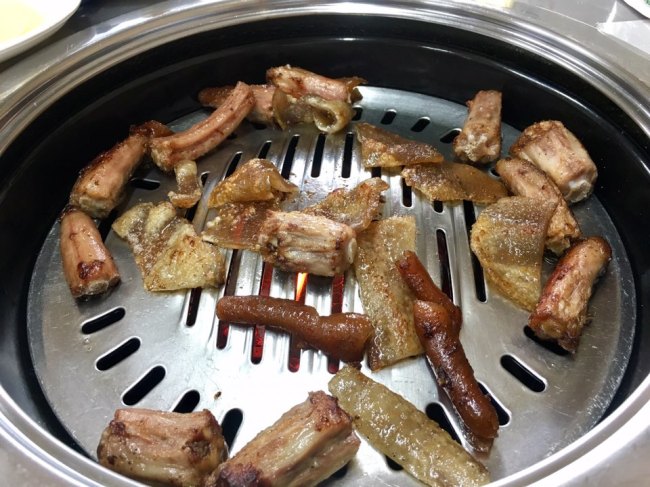Koreans are known for “thoroughly” eating the pig. We barbecue the meat, grill the intestines, make a soup with leftover meat and steam the feet. But there is more to the list: grilling pig tail and pork rinds.
 |
Pork rinds and pig tail (By Im Eun-byel / The Korea Herald) |
When visualizing a pig tail, an image of a squiggly, pinkish, spring-like tail comes to mind. The cute visual isn’t really appetizing. But no worries, pig tail on the grill doesn’t look anything like it.
The tail is chopped into 5- to 8-centimeter pieces, similar in appearance to a chicken’s neck, as the bone is slightly curved with little meat on it. Like the chicken neck, it is hard to chew, as little bits of meat cling hard to the bone.
The taste is not particular -- it’s just pork. But for those who are sensitive, the scent of the pork may be too strong. While not many would welcome it, some enthusiasts seek the dish for its distinctive smell.
The skin on the tail is removed from the bone and served together. Surprisingly, the taste strongly resembles that of chicken feet. It is soft, like the cartilage.
Pork rinds are considered a great delicacy here, especially as a dish with late-night drinks. It may look odd as a piece of opaque plastic-looking pig skin goes on the grill.
But after a while, the grill heats up and the rind rolls up as the color changes to brown. The fat oozes out onto the grill, leaving the skin with a soft, chewy texture. The cooked skin is sticky, and rich with collagen.
Like most dishes, pig skin should be eaten when it is hot. As the heat simmers, the texture becomes tough, making it almost impossible to chew.
By Im Eun-byel (
silverstar@heraldcorp.com)








